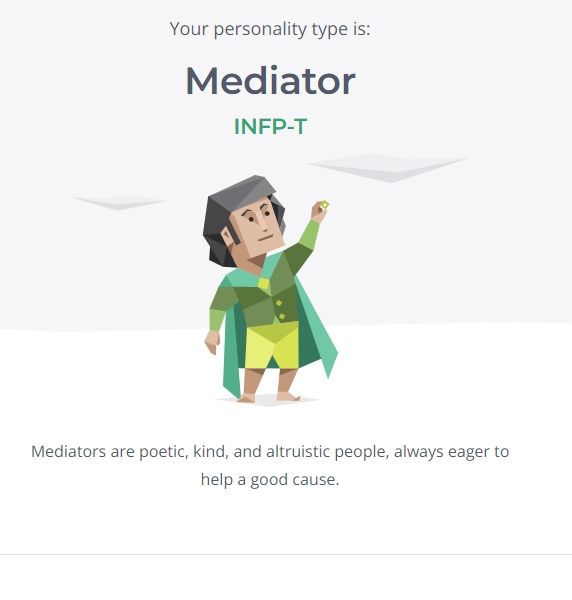
I took a personality test on a site called 16personalities.com It says I am a “mediator.” This is taken from the results I was given. I will highlight parts that really ring true for me.
Although they may seem quiet or unassuming, Mediators (INFPs) have vibrant, passionate inner lives. Creative and imaginative, they happily lose themselves in daydreams, inventing all sorts of stories and conversations in their minds. These personalities are known for their sensitivity – Mediators can have profound emotional responses to music, art, nature, and the people around them.
Idealistic and empathetic, Mediators long for deep, soulful relationships, and they feel called to help others. But because this personality type makes up such a small portion of the population, Mediators may sometimes feel lonely or invisible, adrift in a world that doesn’t seem to appreciate the traits that make them unique.
The Gift of Empathy
Mediators share a sincere curiosity about the depths of human nature. Introspective to the core, they’re exquisitely attuned to their own thoughts and feelings, but they yearn to understand the people around them as well. Mediators are compassionate and nonjudgmental, always willing to hear another person’s story. When someone opens up to them or turns to them for comfort, they feel honored to listen and be of help.
Empathy is among this personality type’s greatest gifts, but at times it can be a liability. The troubles of the world weigh heavily on Mediators’ shoulders, and these personalities can be vulnerable to internalizing other people’s negative moods or mindsets. Unless they learn to set boundaries, Mediators may feel overwhelmed by just how many wrongs there are that need to be set right.
Speaking Their Truth
Few things make Mediators more uneasy than pretending to be someone they aren’t. With their sensitivity and their commitment to authenticity, people with this personality type tend to crave opportunities for creative self-expression. It comes as no surprise, then, that many famous Mediators are poets, writers, actors, and artists. They can’t help but muse about the meaning and purpose of life, dreaming up all sorts of stories, ideas, and possibilities along the way.
Through these imaginative landscapes, Mediators can explore their own inner nature as well as their place in the world. While this is a beautiful trait, these personalities sometimes show a tendency to daydream and fantasize rather than take action. To avoid feeling frustrated, unfulfilled, or incapable, Mediators need to make sure that they take steps to turn their dreams and ideas into reality.
In Search of a Calling
People with this personality type tend to feel directionless or stuck until they connect with a sense of purpose for their lives. For many Mediators, this purpose has something to do with uplifting others and their ability to feel other people’s suffering as if it were their own. While Mediators want to help everyone, they need to focus their energy and efforts – otherwise, they can end up exhausted.
Fortunately, like flowers in the spring, Mediators’ creativity and idealism can bloom even after the darkest of seasons. Although they know the world will never be perfect, Mediators still care about making it better however they can. This quiet belief in doing the right thing may explain why these personalities so often inspire compassion, kindness, and beauty wherever they go.
Mediator (INFP) Strengths
- Empathetic – Mediators don’t just care about other people in an abstract sense. These personalities can actually feel another person’s emotions, from joy and elation to sorrow and regret. Because of this sensitivity, Mediators tend to be thoughtful and kindhearted, and they hate the idea of hurting anyone, even unintentionally.
- Generous – Mediators rarely enjoy succeeding at other people’s expense. They feel called to share the good things in their lives, give credit where it’s due, and uplift the people around them. These personalities want to contribute to a world where every voice is heard and no one’s needs go unmet.
- Open-Minded – Tolerant and accepting, Mediators try not to judge anyone else’s beliefs, lifestyles, or decisions. This is a personality type that prefers compassion to fault-finding, and many Mediators feel empathy even for those who have done wrong. Because they’re so accepting, Mediators often become confidants for their friends and loved ones – and occasionally for total strangers.
- Creative – Mediators love to see things from unconventional perspectives. Few things give them more pleasure than allowing their minds to wander through all sorts of ideas and possibilities and daydreams. It’s no wonder, then, that many Mediators are drawn to creative pursuits – or that this personality type is well represented among writers and artists.
- Passionate – When an idea or movement captures their imagination, Mediators want to give their whole heart to it. People with this personality type may not always be outspoken, but that doesn’t diminish their strong feelings for a cause that speaks to their beliefs and convictions.
- Idealistic – Mediators strive to follow their conscience, even when doing the right thing isn’t easy or convenient. They rarely lose sight of their desire to live a meaningful, purpose-filled life – one that helps others and leaves the world a better place.
Mediator (INFP) Weaknesses
- Unrealistic – Nothing in this world is perfect – and that can be a difficult truth for Mediators to accept. People with this personality type can be hopeless romantics, with rose-colored visions of what their lives should be like. This can set Mediators up for disappointment when reality inevitably falls short of their dreams.
- Self-Isolating – Mediators long to connect with others, but they don’t always know how. Especially in new environments, Mediators may be reluctant to put themselves out there in ways that would help them make new friends or become involved in a new community. As a result, people with this personality type may sometimes feel lonely or isolated.
- Unfocused – Mediators’ imaginative, introspective nature doesn’t always lend itself to productivity. Many Mediators get frustrated by how difficult they find it to buckle down and get things done. The problem isn’t that they are incapable – rather, it’s that they run into problems when they become so caught up in different ideas and ideals that they fail to commit to a course of action.
- Emotionally Vulnerable – The emotional attunement of these personalities is among their greatest strengths. But unless Mediators establish boundaries, they can be at risk of absorbing other people’s negative moods or attitudes.
- Desperate to Please – Conflict tends to be stressful for Mediators, who yearn for harmony and acceptance. When someone dislikes or disapproves of them, these personalities may become fixated on trying to clear the air and change that person’s mind. Unfortunately, Mediators’ desire to please others can drain their energy, eclipsing their inner wisdom and their awareness of their own needs.
- Self-Critical – Mediators believe in their unique potential, and they desperately want to live up to it. But this can cause them to have unrealistic expectations for themselves. When Mediators fail to live up to these visions, they may accuse themselves of being useless or selfish or woefully inadequate. Taken too far, this self-criticism can discourage Mediators, leading them to give up on even their dearest dreams.
Romantic Relationships
Mediators (INFPs) are dreamers and idealists, especially when it comes to romance. People with this personality type believe in the power and beauty of true love, and they sincerely hope never to settle for anything less.
It’s fair to say, then, that Mediators approach the world of romance with high expectations. They may have spent years daydreaming about the perfect relationship, imagining how it would feel to share their innermost selves with another person. But the reality of dating can come as something of a shock to Mediators, forcing them to grapple with a challenging question: If they want to be in a relationship, will they have to compromise on their ideals?
Hopeless Romantics
Mediators don’t just want to find a partner – they want to connect with a soul mate. Thoughtful and open-minded, these personalities are generally willing to consider going out with all sorts of people. Mediators pride themselves on their ability to look past a potential partner’s superficial traits – such as appearance, social status, or possessions – and focus on deeper, more meaningful signals of compatibility.
But it would be a mistake to think that Mediators don’t have preconceived standards for a significant other. With their active minds and imaginations, people with this personality type tend to develop and carry with them a vision of their ideal partner – a vision that may be based on a favorite fictional character, a person they once knew, or simply the stories they’ve told themselves about how love “should” look.
When they meet someone new, most Mediators can’t help but compare that person with the ideal soul mate they’ve envisioned. Unsurprisingly, such comparisons tend to weed out more than a few potential partners. It can be difficult – if not impossible – for a real, flesh-and-blood person to live up to a Mediator’s cherished dreams.
Making an Effort
With time, many Mediators come to learn that true love doesn’t just magically happen – it takes compromise, understanding, and work. After all, no partner is perfect, and even the most beautiful relationships have their challenges. Fortunately, people with this personality type can find a great deal of joy in the effort it takes to strengthen a relationship.
When they fall in love, Mediators reveal just how much passion thrums beneath their quiet exteriors. Devoted and loyal, they nevertheless respect their partner’s independence, aiming to accept their partners as they are. That said, these personalities also want to help their partners learn, grow, and pursue their goals. Mediators are always dreaming up ways to improve themselves and the world around them, and the last thing they’d want is for their partners to feel unhappy or stuck.
Many people with this personality type dedicate themselves to helping their partners improve their lives. While this is a noble goal, Mediators must be sure to keep track of their own needs and make sure that their partners are really ready to change. Provided they do so, Mediators’ support and devotion can make all the difference in their partners’ lives.
Finding What’s Real
Mediators tend to promote harmony over disagreement. Although this lends stability to their relationships, it can also lead to problems. To avoid triggering a conflict, Mediators may avoid talking openly about things that are bothering them – instead, they might mentally fixate on the problem or try to solve it on their own. They may also focus on making their partner happy, to the detriment of their own priorities and sense of self.
People with this personality type may need to remind themselves that open, honest communication is necessary in a relationship, even if it isn’t always easy. In fact, such moments of candor can transform a relationship for the better.
As long as they communicate openly, Mediators are more than capable of staying true to themselves in a relationship – and encouraging the person they care about to do the same. By bringing their whole hearts and minds to their relationships, Mediators can find out what it truly means to love and be loved.
Friendships
When it comes to their social lives, Mediators (INFPs) may find themselves caught in a web of contradictions. People with this personality type crave alone time, but they’re also vulnerable to loneliness. They long to feel accepted and well-liked, but they hate the idea of pretending to be anyone but their authentic selves. And while they hesitate to draw attention to themselves, they don’t want to be invisible, either.
The good news is that, in the company of true friends, Mediators can escape the hamster wheel of these insecurities and focus on what really matters. For these personalities, friendship is a precious commodity – an opportunity for two people to lift each other up and change each other’s lives for the better. Mediators truly believe in the old saying that “a friend in need is a friend indeed.” Few things bolster their sense of purpose like being there for someone they care about.
Perhaps because of their intense investment in these relationships, Mediators tend to feel most fulfilled by spending time with a small, intimate circle of friends. Acquaintances may come and go, but this inner circle is likely to include Mediators’ friends for life.
Searching for a Kindred Spirit
Although Mediators are warm and accepting, they don’t always find it easy to make friends. This may be because superficial, casual relationships can leave these personalities feeling a bit empty. Mediators are looking for lasting, authentic friendships with people who share their desire to think and feel deeply, to do the right thing, and to give more to the world than they take from it.
That said, Mediators are capable of befriending all sorts of people. The combination of their Intuitive and Prospecting personality traits draws them to diverse perspectives, which helps them appreciate friends whose experiences and worldviews are totally different from their own. Mediators may actually find it invigorating to connect with someone who, on the surface, has little in common with them.
For Mediators, a true friendship is founded on shared values, not just shared experiences. People with this personality type are unlikely to form strong friendships simply out of convenience. For example, while their affection for their coworkers may be strong, just working in the same office or shop isn’t enough for Mediators to guarantee a substantial friendship. Deeper connections must come into play.
Friends for Life
When Mediators befriend someone, they may secretly (or not so secretly) hope to stay close with that person for life. These personalities are capable of strong, stable relationships marked by passionate support, subtle poetic wit, and a profound level of emotional insight. Long-standing friendships tend to draw out less obvious aspects of the Mediator personality type, including a fierce protective streak. Many Mediators find that they can stand up for their friends in ways that they’d struggle to manage for themselves.
Although Mediators value their friendships, they also need personal space and alone time in order to recharge. At times, people with this personality type may withdraw from even their closest friends in order to reconnect with themselves and restore their energy, as all Introverts must. These departures are usually temporary, but Mediators may need to make sure that their friends don’t feel snubbed by their absence.
Mediators look for ways to improve their friendships and share their affection with those who matter to them. Often, this takes the form of spending quality time with their friends – coming up with grand visions for the future and sharing their secret dreams and ideas with someone they know they can trust. But even when Mediators are entirely on their own, they always hold their friends in their hearts.
The summary goes on about INFP’s job types, parenting styles and such, but this was the most important part of the summary, I felt. I felt that it really describes me well. Especially the part about empathy and the desire for friendships to last forever. Lately I’ve been reaching out to old friends. Some have responded well, while others have ignored me. It has been a happy and sad experience. The part about being fixated on wanting to clear the air really rings true for me, as last December I reached out to someone who was a very precious friend to me —a kindred spirit whom I had hoped would have been happy to hear from me after all this time, and she has only ignored me since then. I’ve tortured my mind with all sorts of scenarios as to why she has zero interest in talking to me, as she was someone I valued so greatly… yet I failed to tell her so over two decades ago when I knew her… before I moved to Japan the first time. I have made efforts to reestablish our friendship, only to be ignored. It makes me sad. Maybe if I had been a better friend, then such friends would be pleased to hear from me. People whom I loved so much… I just want to let them know that they will always matter to me…

